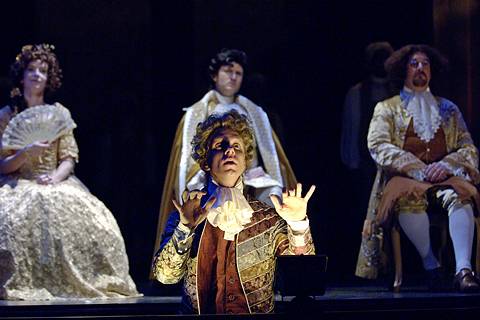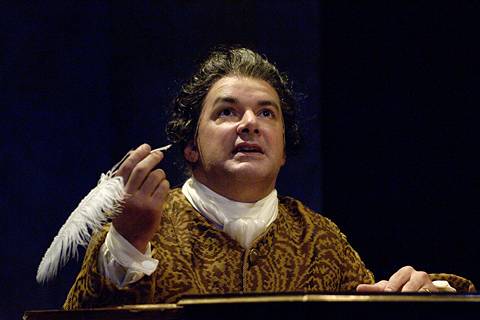|

Too many words?
Peter Shaffer's play 'Amadeus',
reviewed by KELLY FERJUTZ
How can a sumptuous production, positively stunning performances by a marvelous company of actors, and a magnificent sound system playing glorious music possibly end up being less than entirely superb? When the play has been tinkered with -- too many times, and not always successfully -- by the playwright.
Even though Amadeus won every possible award -- the Tony in 1981 for Best Play (plus best actor, scenic design, costumes and lighting, plus director) for the original New York production, and best revival award in 1999-2000, not to mention the Oscar in 1984, Golden Globe in 1985 and the BAFTRA award the following year, Peter Shaffer cannot resist making further revisions to his original marvelous playscript. Amadeus has apparently become his 'unfinished symphony, er, script'. Possibly the Oscar for 'best writing based on material from another medium' unleashed this constant need to change things. But different is, unfortunately, not always better.
The version of this remarkably dramatic saga staged by Great Lakes Theater Festival in Cleveland, Ohio, USA (17 September 2005), is reported to be the sixth such by Mr Shaffer; it is longer and talkier than the original. If the audience might prefer an earlier version of his script, the playwright would certainly be unable to find even a minute flaw in this production. It is dramatic and engaging, in spite of its wordiness.

Ben Nordstrom in the title role of 'Amadeus' (foreground), with Kathryn Cherasaro (Costanze Weber), Dougfred Miller (Joseph II) and Paul Kiernan (Johann von Strack) (background). Photo © 2005 Roger Mastroianni
|
In an age of classical names bestowed upon infants, it is perhaps not so surprising that baby boy Mozart would have been given the second name of Amadeus. It means 'Beloved of God', and was perhaps, a hint from the pushy father to the Almighty as well as to his small son. When young Mozart's world intersected with that of Salieri, it seemed to describe the hopelessness of the older composer who could recognize genius although he himself had little of it.

Andrew May as Antonio Salieri in 'Amadeus'. Photo © 2005 Roger Mastroianni
|
Salieri had tried to live a Godly life, abstaining from the seven deadly sins which Mozart seemed to embrace with great joy. But, as we all learn eventually, life is seldom fair.
Continue >>
Copyright © 1 October 2005
Kelly Ferjutz, Cleveland USA

|

